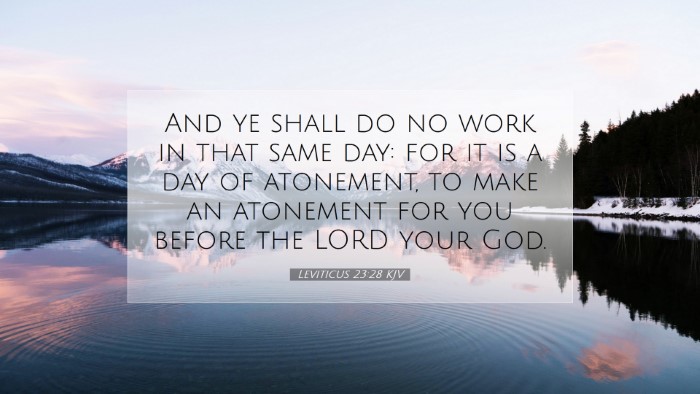Commentary on Leviticus 23:28
Leviticus 23:28 states: "And you shall not do any work on that very day, for it is a Day of Atonement, to make atonement for you before the Lord your God." This verse is pivotal in understanding the significance of the Day of Atonement (Yom Kippur) in the Hebrew Scriptures and its implications for both ancient Israel and contemporary theological discourse.
Contextual Understanding
The book of Leviticus is often referred to as the Holiness Code, detailing the laws and rituals meant to establish the holiness of the Israelite community. Chapter 23 specifically outlines the annual festivals, among which the Day of Atonement stands as a central observance.
- Matthew Henry emphasizes that the Day of Atonement is a day set apart for worship and reflection, underscoring the need for the community to pause their daily activities in recognition of their spiritual state.
- Albert Barnes notes that this day serves a critical purpose—not only for individual repentance but as a corporate act of atonement for the entire nation of Israel.
- Adam Clarke insists that this day, marked by fasting and humility, serves as a stark reminder of the gravity of sin and the essential need for reconciliation with God.
Theological Significance
The theological implications of Leviticus 23:28 extend beyond mere ritual observance to the heart of atonement theology. This verse highlights several key themes:
- Separation for Holiness: As Henry remarks, abstaining from work indicates a separation from worldly concerns, allowing for a focus on divine matters. This act of setting apart reflects a profound recognition of God's holiness.
- Atonement's Corporate Nature: Barnes addresses the community aspect of atonement, stressing that all Israel was to come together for this purpose. It reinforces the understanding that sin affects the community and the need for collective repentance.
- God's Initiative in Reconciliation: Clarke points out that the Day of Atonement was initiated by God Himself, emphasizing that atonement is not a human endeavor but a divine provision for reconciliation. The verse reminds the reader that atonement is an act of grace from God.
Practical Applications
Moving beyond the historical context and theological significance, the practical applications of Leviticus 23:28 are manifold:
- Importance of Reflection: The command to cease from work invites modern believers to prioritize times of reflection and spiritual renewal amidst busy lives.
- Community Worship: Just as the Israelites gathered, there is value in corporate worship and repentance in the life of the Church, reminding us that we are part of a larger body.
- Recognizing Grace: Understanding the atonement should lead to gratitude and humility. Acknowledging that reconciliation with God comes from His initiative can foster a deeper relationship with Him.
Conclusion
In summary, Leviticus 23:28 is not only a directive for ancient Israel but a profound theological statement on the nature of atonement, community, and God’s holiness. Drawing from the insights of Matthew Henry, Albert Barnes, and Adam Clarke, we gather that this verse calls readers to understand the seriousness of sin, the necessity of collective repentance, and the gracious provision that God has made for atonement. It serves as a reminder of the importance of holiness in our daily lives and the need to reflect on our relationship with God.


